|
Welcome to the Summer edition of the Newsletter.. Once again there’s lots to cover here including the Education Supper, Master’s Musings, Get to Know Malcolm Green (and Collette Stone) and a distinctly nautical theme at the back end…
Master's Musings
I am now well over halfway through my year, and the past quarter has held a lot of special events to add to those of the first five months. What follows are the edited highlights!
Being involved in a programme at City Uni focused on introducing schoolchildren from lower socioeconomic backgrounds to the range of potential careers in the City, run under the aegis of the Lord Mayor, I was invited to lunch by the Tallow Chandlers in respect of this Summer Schools programme but welcomed as the Master of the WCoMC, with the hosting Master saying he was so pleased to see a fellow Master doing something so rewarding and using the Masters’ network to promote it.
I continue to co-ordinate the Steering Group of the LM’s Smart Economy Network initiative, working alongside the IPM World Trader and a lot of very able and focussed people, looking to bring the City of London to the fore in digital trading.
On the Masters’ Circuit, I attended the United Guilds Service, followed by lunch at Wax Chandlers’ Hall, hosted by Master Dame Fiona Woolf, a late Lord Mayor. Alongside the other Modern Livery Companies, I attended a dinner hosted by the Solicitors at Armourers’ Hall, and attended a lunch of the 100+ group of Companies at the IT Hall, hosted by the World Traders. This band of the newest Companies is growing steadily and we expect to welcome the Communicators very soon, followed by the Entrepreneurs and the Investment Managers, with the HR Professionals also progressing on their own road to Livery. I am working with a number of these newer Companies on events more targeted to intellectual debate on topics of interest to our professions.
I attended a Lecture on “Why is Philanthropy so difficult these days?”, very well written up by PM Steve Cant in the recent GTK Philanthropy Newsletter, and giving us some food for thought on funding for charities, as well as the Master Solicitors’ Lecture on the Price of Professional Integrity, interestingly given by a lawyer! Earlier that same day had been the lunch for FSG Masters and Clerks, hosted by the Marketors, where we enjoyed being outdoors at Stationers’ Hall. After that, there was a Livery Committee Reception at Grocers’ Hall, and my final Master’s event of the past quarter was a further Masters and Clerks lunch hosted by the Drapers at their wonderful Hall. I was seated next to David Chalk, the incoming Sheriff (STE) who commented on how much our Company was doing on the philanthropy front, and commended Bob Harris on his great efforts to make people aware of the Livery Movement’s work - so great to hear our Company and long-standing member being praised.
Turning to our own Company events, I have not managed to support as many of the CMCE offerings as I would like, due to clashes with the Masters’ Circuit or work but I recently opened the day’s proceedings on the joint sessions with BAM MCN and it was truly fascinating. It is great to see what the CMCE is achieving alongside our Education Committee, and I look forward to becoming a more regular attendee in the future.
I appreciate there have not been many in-person general events for our members this past quarter but we focused on the Mansion House Banquet. We were all looking forward to the 20th anniversary summer celebration but, sadly, we had to cancel it: there were simply too few bookings for this event and to have gone ahead would have entailed far too great a loss. I will try to get our Company's history displayed at some point later this year, if possible, and hope we can get more members engaged to learn about our history.
I thank you all again for all your support and look forward to working together with the same harmony over the remaining months of my Master’s year.
Education Lecture and Supper
Court Assistant Ian White reports:
This year’s Education Lecture and Supper took place on the 19th of June 2024 at Bakers' Hall. The evening started with an admission ceremony for Himanshu Jain. Congratulations to him.
The Lecture and Supper were hosted by 2nd Warden Malcolm McCaig, Chair of the Education Committee. Our guest speaker was Dr Chris Dalton, Associate Professor of Management Learning at Henley Business School. He presented a lay practitioner’s perspective on Generative AI in Higher Education. Drawing on examples from its use and experience in British universities, and with the field of management consultancy in mind.
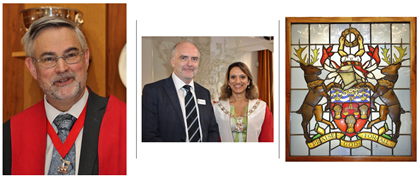
Chris outlined what Generative AI in education is, what the implications are of its adoption and use, the promise it might hold, as well as the pitfalls and dangers that must be considered. While making it clear that we should not be afraid of AI and what it might achieve, Chris could not indicate where precisely where AI might lead us – no one can – as its possibilities may be endless. My take away was that we must work with AI and utilise it in the right way. But, of course, it is a journey on which we are really only at the beginning. The subject of AI which Chris brought enthusiasm and energy to in his talk generated many question during the evening so much so that we could easily have run over time.
After a delightful supper, accompanied by matched wines from our Company cellar, there was a sprightly Q&A session, with many asking about AI generally as well as in the educational context (Ed: Also see below).
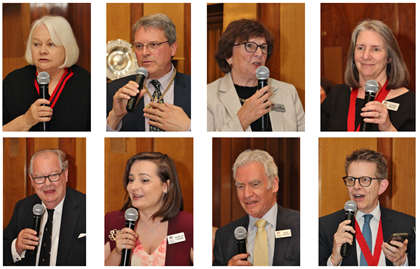
Overall, it was an enjoyable evening with a blend of intellectual stimulation and culinary delight.
Get to Know... Malcolm Green
Our Founding Master, David Miller, proposed me for the Company in 2000: David had been my boss at what was then Coopers & Lybrand, now PwC.
I had started my consulting career in David’s team at C&L in 1980, advising government clients on performance improvement and financial management reform. One of the highlights of this period was a year on secondment at H M Treasury where, one evening, I was summoned to make a presentation to Willie Whitelaw, then deputy Prime Minister to Margaret Thatcher, in his office in the House of Lords. It must have gone well as, when I finished, Lord Whitelaw asked me if I had time for a drink, and uncorked a bottle of wine which we finished off together. He then said he wanted Margaret to see my presentation – but it never happened. Working at the Treasury led to other assignments in Whitehall, notably work for the Royal Navy.
My first charity consulting project was advising the Salvation Army on the separation of its international HQ from the UK organisation – a reflection of its increased global reach.
Public sector work in the UK led to assignments for the Hong Kong Government, and in 1989 I moved to Hong Kong as a Director of C&L. This was a fascinating time as Hong Kong moved towards the change of sovereignty in 1997. Much of my work was concerned with preparing for that handover. The firm also encouraged voluntary activities and I was Hon. Treasurer of the China Coast Community, which ran a care home for senior citizens who had somehow slipped through any safety net: we had a remarkable range of residents, including Russian émigrés who had escaped the Bolshevik revolution and somehow washed up on the China coast, and former prisoners of war who had remained in the region after 1945.
After leaving C&L in the mid-90s I invested in two small consultancies, both of which were successfully grown and then sold. Despite our small size, we took on high profile work, including acting as institutional development advisers to the Palestinian Authority which required working with Yasser Arafat and other PLO figures in the West Bank and Gaza.
Recently I have assisted The World Bank and the IMF with organisational and HR advice to government clients, mainly in Latin America and Asia-Pacific, but only part-time. This has allowed me to do more charity work, with the Company’s pro-bono clients (YBI, MagicMe, MapAction), and others (Ripplez, Resurgo, Street League and DFN Project SEARCH).
In September 2023 I became Chair of the Company’s Membership Committee. We are focusing on building our pipeline of applicants, and this is bearing fruit: Court approved 10 new members at its last meeting. My aim is to ensure continued robust growth in the Company’s membership: our future depends on it.
I am married to Liz, with one son, and we live in Wimbledon. I play golf, go long-distance cycle touring, and have fun renovating an old country house in the south of France.
What I learned about organisational development
Third Warden Collette Stone recently had a thought-provoking article published in the Civil Service Journal “Government in Action”. It’s on the theme of keeping an open mind when seeking to resolve issues. Now read on…
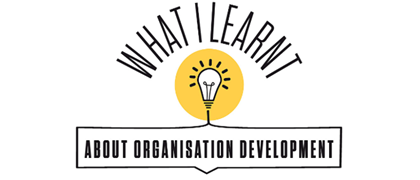
"I'm a chameleon by profession. Otherwise known as an organisation development consultant.
I left the civil service two years ago and can see, in hindsight, just how much the cross-department working I did shaped who I am and the portfolio consultancy career I have now. I started in the civil service as an immigration officer at Heathrow — surrounded by smart, knowledgeable colleagues and a strong team ethos. But a long-term posting to the Training Unit — the first woman in that role - helped me find my calling as a developer of people, and I moved into learning and development and then organisation development.
In several Whitehall-based roles I supported hundreds of teams and leaders in many functions and all levels in their search for greater effectiveness and capability, and then resilience - and learned something of great value from each of them. What did I learn? Overall, of most value was learning to see above and below an organisation’s waterline - getting to the heart of a business issue to help resolve it, by tuning in to what is said, and what is not said. I rarely took anything at face value.
When a manager said, “the problem is 'x'”, I knew that, on investigation, it was much more likely to be 'y'. “The processes are wrong”… Maybe. But let's have a quiet look at leadership style and team cohesion on the way past, just in case.
“It's all the leader's/team's fault.”…..' Sometimes, but if we stand back and look at it from over here - any clunky processes, an uncomfortable office environment, under- equipped, could be clues to why the deliverables aren't getting delivered. Seeing below the surface saved time and effort.
I learned to be whatever someone needed me to be. Over my civil service career my job title changed almost annually, to suit the mood of the department and the needs of the budget holder. 'Assistant' this, 'Head of' that, Deputy, Trainer, Facilitator, Coach, Mentor, Adviser, Manager, Designer, Consultant, Co-ordinator, Change lead……
Irrespective of organisational function or location, the job and the purpose were always essentially the same — organisation development (OD). But OD is a label that doesn't always open career doors. I learned to shift mindset, eventually, and be comfortable with my labels.
In time I developed more strategic muscle and learned it was OK to mentally step across the tramlines and think creatively about an issue, to contribute what was needed, as well as what was asked for. But this shift came with a deeper awareness of the importance of psychological safety. if I don't feel safe, I won’t deliver. Simple. This new sensitivity found its way into my consultancy work now — coaching for staff at a career crossroads and experiencing burnout.
I found I was suited to spotting the nuances of human emotion and enjoyed adding value by being the oil in the machinery through playing these different roles:
1. Sounding board: the person you can talk to in confidence when there's nobody else — knowing you can trust me with anything and feel safe, not judged.
2. Puzzle solver: when you know something’s not right for the team, or the objectives, I'll find out what that is and give you some options for what to do about it.
3. Fixer: I can go behind the scenes, initiate conversations, broker better relationships and hand an issue back to you to publicly resolve.
4. Noticer: the person in the comer of the meeting: an observer, or perhaps note taker, but the real job is noticing - to shape a view for you of what is really going on.
5. Voice unifier: when the team cares about its work but individual disconnections or misunderstandings disrupt it, I'll find where the breaks are and help you mend them by advocating for those who feel unheard."
Future Events
Sticking with Third Warden Collette Stone, I am happy to report that Collette has now taken over responsibility for developing and coordinating our events programme, working closely with First Warden Andy Miles, and looking ahead as far as summer 2026. They are keen to put together an events programme which is balanced in terms of:
• a mix of fun social events and events aimed more at learning, education and personal development,
• a mix of accessible low-cost events and more expensive suppers and dinners
• an even distribution across the calendar.
More on that in the next Company Newsletter, which will focus primarily on the future events programme. Collette will be guest editor for that edition, planned for Sept. 2024 (after the summer recess).
Meanwhile, our next major event will be the Annual Church Service and reception on 25th September, after the Election Court. Save the date.
RNLI Blue Plaque
PM Edward Sankey Reports: On 20th May, our Honorary Liveryman, The Lord Mayor Alderman Professor Michael Mainelli unveiled a Blue Plaque at 12 Austin Friars in the City. It marked where the RNLI had its first Headquarters. The date was almost 200 years to the day since the HQ was established. To Livery Company Members, it is a special pleasure that Furniture Makers’ Hall is the building. A large crowd included many members of the Livery, crew of the Tower Lifeboat, a Sea Cadets Unit, and RNLI supporters.
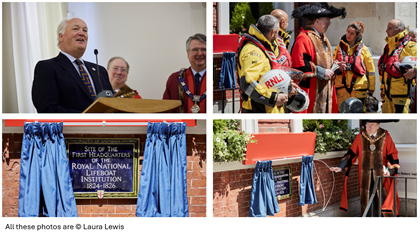
Afterwards, the Lord Mayor spoke of the strong connection of the Square Mile to sea trade. He specially referred to the connections of Livery Companies, including the City Livery YC having just presented trophies at its Regatta! In 200 years RNLI volunteers and staff have saved over 146,270 lives - an average of two a day. Mark Dowie, CEO of the RNLI, said there are 238 lifeboat stations and many shore lifeguard units. He paid tribute to the volunteer crew, the volunteer fundraisers, the donors, and RNLI staff who over years have made this possible.
The Institution was founded by Sir William Hillary in the City of London Tavern in Bishopsgate on 4 March 1824. He had witnessed many shipwrecks around the Isle of Man and decided a national service was needed. On 22 May 1824 the charity established its first offices at 12 Austin Friars. It remained the HQ until 1826.
The costs of the plaque and its installation were raised by Frank Moxon (International Banker) walking 100 miles in four days. The Corporation granted that the Plaque be bestowed. The Lord Mayor, a sailor himself, gave great support throughout.
(Ed: I had two aunts who were keen supports of the RNLI – in their wills! Their names now appear on a recently launched LifeBoat! You too can donate here.)
Six men in A Boat - The Inter Livery Regatta
Staying on the water, Past Master Geoff Llewellyn has filed a report of the Regatta, held on Saturday 18 May. Geoff was joined by Members PM Edward Sankey, Alan Greenwood, Hugh Tinsley and also Jeff Cant (an ex-member) and Andrew Wood. Geoff’s report is in the style of, and with apologies to, Jerome K. Jerome: “The chief beauty of this account lies not so much in its literary style, or in the extent and usefulness of the information it conveys, as in its simple truthfulness.” You can read Geoff’s full, very amusing, report here.
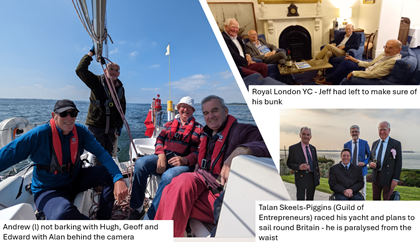
Artificial intelligence and Management Consulting
We’ve all recently seen and heard a lot about AI, and how it could affect Management Consultancy in various forums, including CMCE. Here’s a summary:
Artificial intelligence (AI) is profoundly transforming the management consulting industry. When applied judiciously, AI-driven tools offer immense potential in delivering enhanced value to clients, operating more efficiently, and accelerating growth. However, overreliance on algorithms without human oversight poses substantial risks that must be pre-empted.
Here are some ways that AI is reshaping management consulting:
1. Automating Core Deliverables with AI Writing Assistants: Innovative AI writing tools allow consultants to synthesize research data, market analyses, and strategy discussions into polished deliverables with greater speed. However, human oversight remains crucial to ensure relevance and customised recommendations tailored to each client’s unique needs.
2. Providing 24/7 Client Support with AI Chatbots: Intelligent conversational AI chatbots can deliver personalised client support anytime, freeing up consultants’ time. While bots excel at simplicity and availability, they lack human nuance and rapport-building abilities. A blend of bot capabilities and human interactions strikes the right balance.
By responsibly embracing the AI revolution, management consulting firms can accelerate growth, improve clients’ experiences, empower employees, and build more innovative and sustainable practices.
(Ed: Full disclosure: I put this piece together with the help of “co-pilot” – the AI in the BING search engine . I just had to correct American spellings of ‘customised’ and ‘personalised’ ☹. The image is AI generated too.)
And Finally ... Three Lions in Germany
“It’s coming home, it’s coming home, football’s coming home..*”
That was the hope of most England football fans heading to Germany for the EURO24 tournament, Court Assistant Bob Harris included. He had accumulated 40 loyalty caps by following England over the past few years and was in the top 2,000 England supporters and thus guaranteed tickets for all the England matches. Lucky Bob, who relects on his experience in Germany here:
"International tournaments pose a logistical challenge: apart from the group stage matches, you don’t know where you will be playing next nor on what day. But decision-making under uncertainty is what we do in our day job: our strategy was to travel by car to give flexibility on times and accommodation options. Our match venues turned out to be Gelsenkirchen, Frankfurt, Cologne, Dusseldorf, Dortmund and Berlin. But we also needed decent accommodation: this is expensive in matchday cities, so we stayed in hotels and AirBnBs in Krefeld, Arras, Koblenz, Maastricht, Essen, Zandvoort, Wuppertal and Potsdam.
You will all know the results: a powerful Jude Bellingham header led to a win over Serbia in our first match, followed by two less inspiring draws against Denmark and Slovenia. Onto the round of 16 where we made hard work against Slovakia but with a brilliant 95th minute equaliser from Bellingham and a winning goal by captain Harry Kane in the first minute of extra time. Massive celebrations by the England fans with plenty of beer in the air.
Now we were into the serious stage of the tournament: another close win against Switzerland after extra time and victory in the penalty shootout. Four days later most of Holland seemed to be driving to Dortmund for our semi-final – the only time we were outnumbered by opposition fans, although we won hands down on flags and singing! Another close match won in the dying seconds. More flying beer.
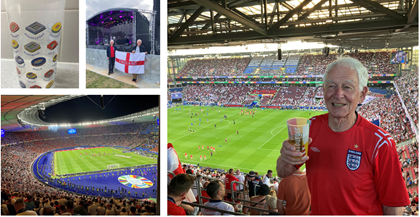 d And then to the denouement in Berlin. It was a game of fine margins: the England fans went wild when we equalised, but it was not to be and there was a downbeat mood when Spain took the lead ten minutes later. Spain was the better team and deserved to win. Sadly football is not coming home just yet. d And then to the denouement in Berlin. It was a game of fine margins: the England fans went wild when we equalised, but it was not to be and there was a downbeat mood when Spain took the lead ten minutes later. Spain was the better team and deserved to win. Sadly football is not coming home just yet.
In conclusion, watching your own team is just part of the enjoyment of following a major tournament. Every day in the first fortnight there were several matches scheduled, and the bars and restaurants were full of fans from many countries leading to many international discussions. And despite football’s past reputation there was no fan trouble."
* © Ian Broudie,David Baddiel & Frank Skinner
Ed: Many thanks to all those who contributed content for this Newsletter, and to you, gentle reader, for getting this far. (Err... Now I'm beginning to sound like Lady Whistledown!).
Have a great Summer break and we'll see you in September.
Steve Cant
Editor
|